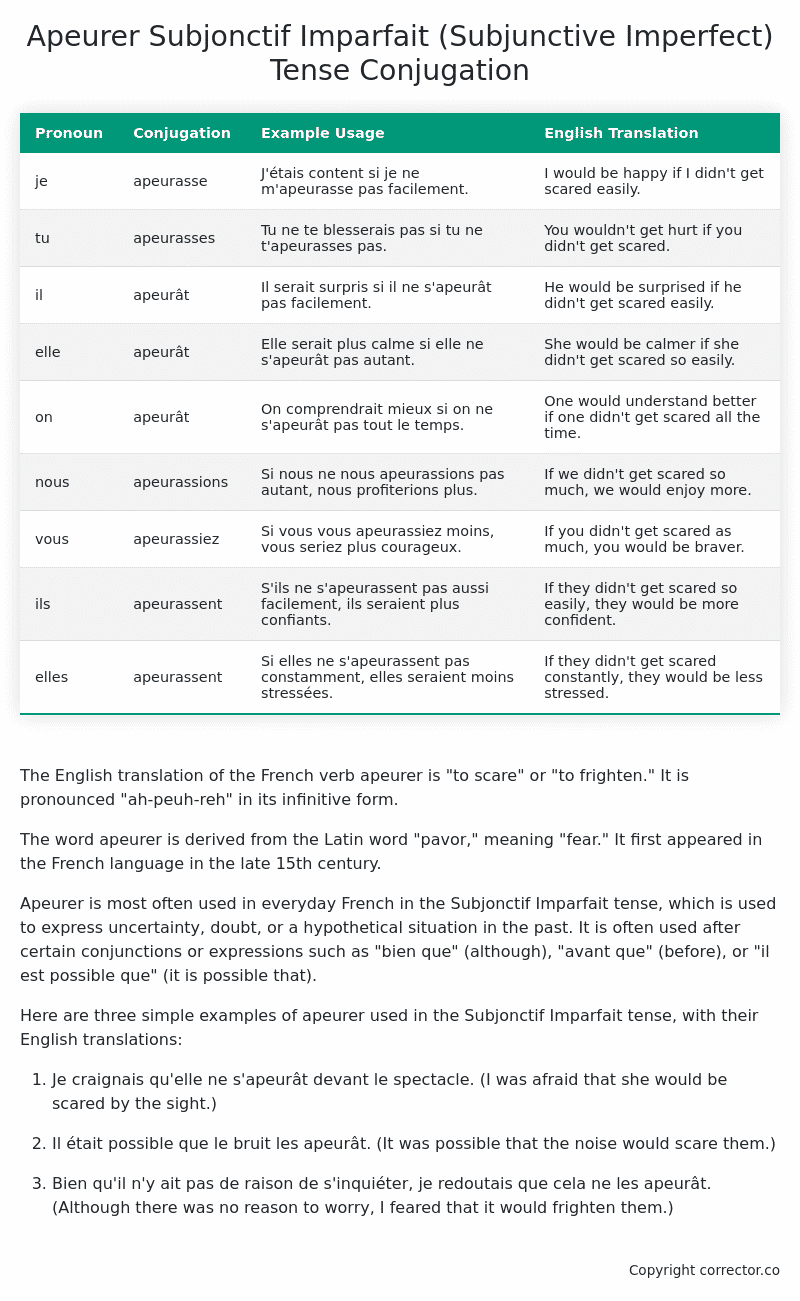Subjonctif Imparfait (Subjunctive Imperfect) Tense Conjugation of the French Verb apeurer
Introduction to the verb apeurer
The English translation of the French verb apeurer is “to scare” or “to frighten.” It is pronounced “ah-peuh-reh” in its infinitive form.
The word apeurer is derived from the Latin word “pavor,” meaning “fear.” It first appeared in the French language in the late 15th century.
Apeurer is most often used in everyday French in the Subjonctif Imparfait tense, which is used to express uncertainty, doubt, or a hypothetical situation in the past. It is often used after certain conjunctions or expressions such as “bien que” (although), “avant que” (before), or “il est possible que” (it is possible that).
Here are three simple examples of apeurer used in the Subjonctif Imparfait tense, with their English translations:
-
Je craignais qu’elle ne s’apeurât devant le spectacle. (I was afraid that she would be scared by the sight.)
-
Il était possible que le bruit les apeurât. (It was possible that the noise would scare them.)
-
Bien qu’il n’y ait pas de raison de s’inquiéter, je redoutais que cela ne les apeurât. (Although there was no reason to worry, I feared that it would frighten them.)
Table of the Subjonctif Imparfait (Subjunctive Imperfect) Tense Conjugation of apeurer
| Pronoun | Conjugation | Example Usage | English Translation |
|---|---|---|---|
| je | apeurasse | J’étais content si je ne m’apeurasse pas facilement. | I would be happy if I didn’t get scared easily. |
| tu | apeurasses | Tu ne te blesserais pas si tu ne t’apeurasses pas. | You wouldn’t get hurt if you didn’t get scared. |
| il | apeurât | Il serait surpris si il ne s’apeurât pas facilement. | He would be surprised if he didn’t get scared easily. |
| elle | apeurât | Elle serait plus calme si elle ne s’apeurât pas autant. | She would be calmer if she didn’t get scared so easily. |
| on | apeurât | On comprendrait mieux si on ne s’apeurât pas tout le temps. | One would understand better if one didn’t get scared all the time. |
| nous | apeurassions | Si nous ne nous apeurassions pas autant, nous profiterions plus. | If we didn’t get scared so much, we would enjoy more. |
| vous | apeurassiez | Si vous vous apeurassiez moins, vous seriez plus courageux. | If you didn’t get scared as much, you would be braver. |
| ils | apeurassent | S’ils ne s’apeurassent pas aussi facilement, ils seraient plus confiants. | If they didn’t get scared so easily, they would be more confident. |
| elles | apeurassent | Si elles ne s’apeurassent pas constamment, elles seraient moins stressées. | If they didn’t get scared constantly, they would be less stressed. |
Other Conjugations for Apeurer.
Le Present (Present Tense) Conjugation of the French Verb apeurer
Imparfait (Imperfect) Tense Conjugation of the French Verb apeurer
Passé Simple (Simple Past) Tense Conjugation of the French Verb apeurer
Passé Composé (Present Perfect) Tense Conjugation of the French Verb apeurer
Futur Simple (Simple Future) Tense Conjugation of the French Verb apeurer
Futur Proche (Near Future) Tense Conjugation of the French Verb apeurer
Plus-que-parfait (Pluperfect) Tense Conjugation of the French Verb apeurer
Passé Antérieur (Past Anterior) Tense Conjugation of the French Verb apeurer
Futur Antérieur (Future Anterior) Tense Conjugation of the French Verb apeurer
Subjonctif Présent (Subjunctive Present) Tense Conjugation of the French Verb apeurer
Subjonctif Passé (Subjunctive Past) Tense Conjugation of the French Verb apeurer
Subjonctif Imparfait (Subjunctive Imperfect) Tense Conjugation of the French Verb apeurer (this article)
Subjonctif Plus-que-parfait (Subjunctive Pluperfect) Tense Conjugation of the French Verb apeurer
Conditionnel Présent (Conditional Present) Tense Conjugation of the French Verb apeurer
Conditionnel Passé (Conditional Past) Tense Conjugation of the French Verb apeurer
L’impératif Présent (Imperative Present) Tense Conjugation of the French Verb apeurer
L’infinitif Présent (Infinitive Present) Tense Conjugation of the French Verb apeurer
Struggling with French verbs or the language in general? Why not use our free French Grammar Checker – no registration required!
Get a FREE Download Study Sheet of this Conjugation 🔥
Simply right click the image below, click “save image” and get your free reference for the apeurer Subjonctif Imparfait tense conjugation!

Apeurer – About the French Subjonctif Imparfait (Subjunctive Imperfect) Tense
Formation
Common Everyday Usage Patterns
Interactions with Other Tenses
Subjonctif Présent
Indicatif Passé Composé
Conditional
Conditional Perfect
Summary
I hope you enjoyed this article on the verb apeurer. Still in a learning mood? Check out another TOTALLY random French verb conjugation!


